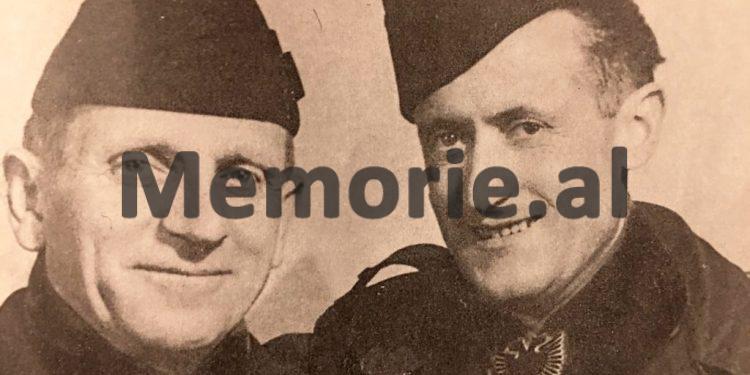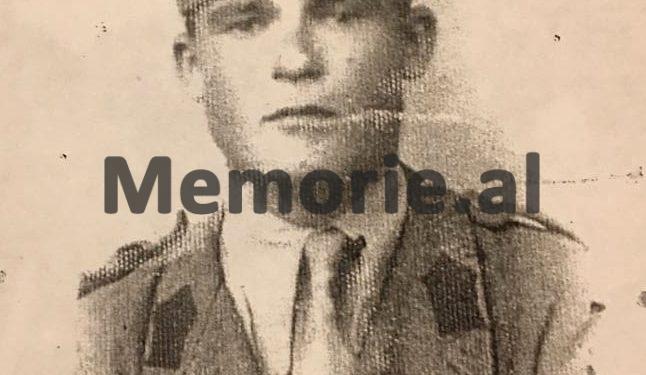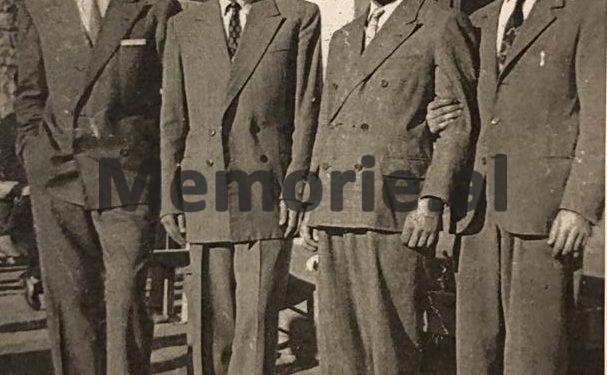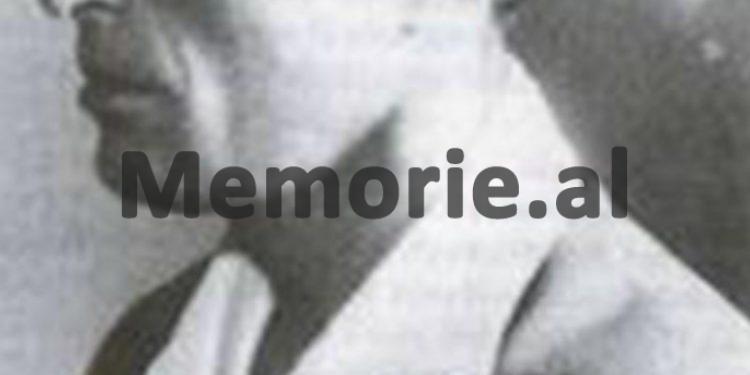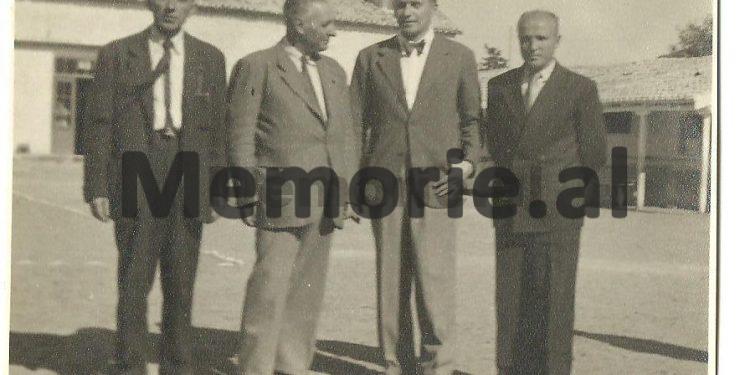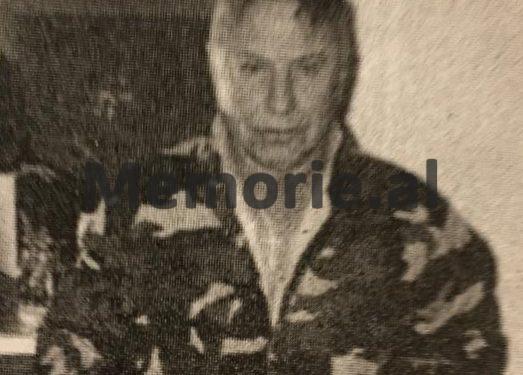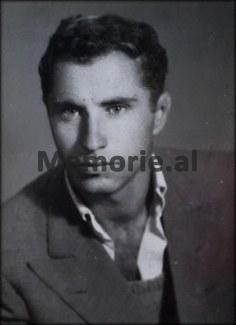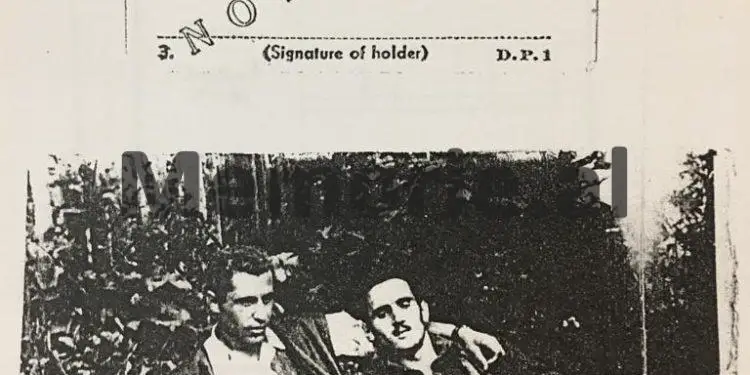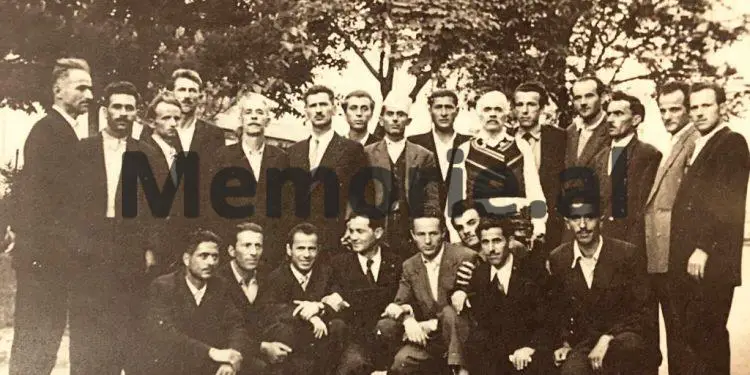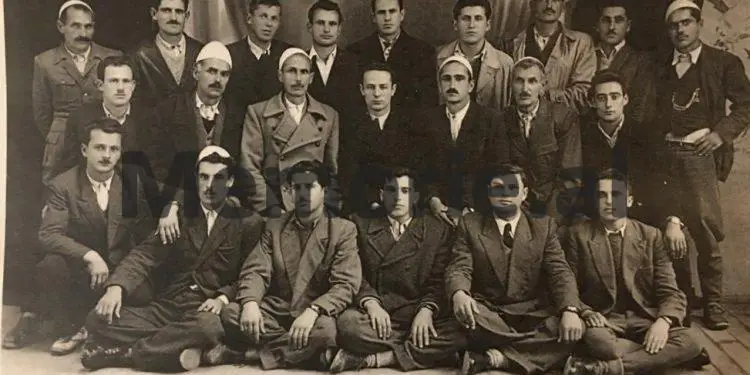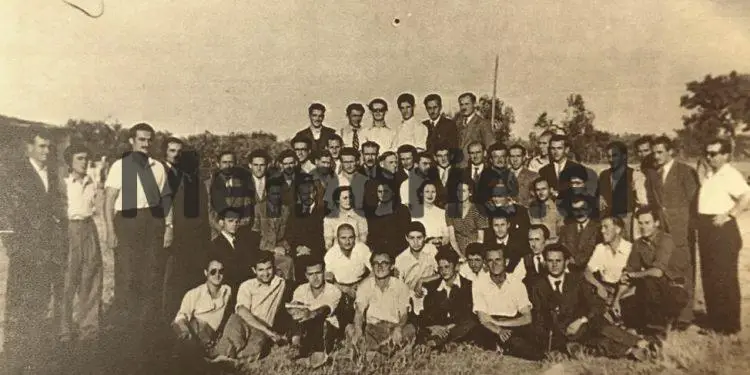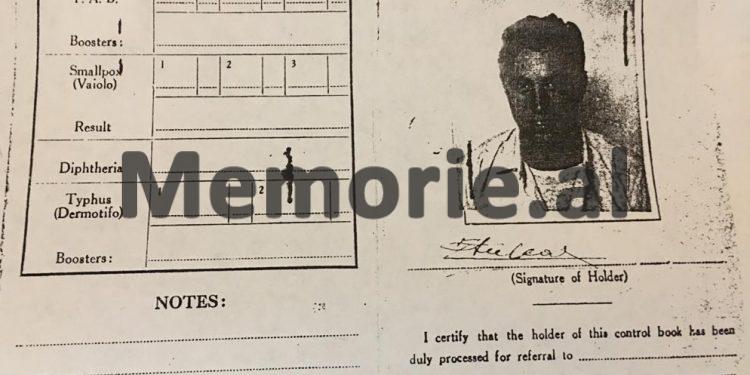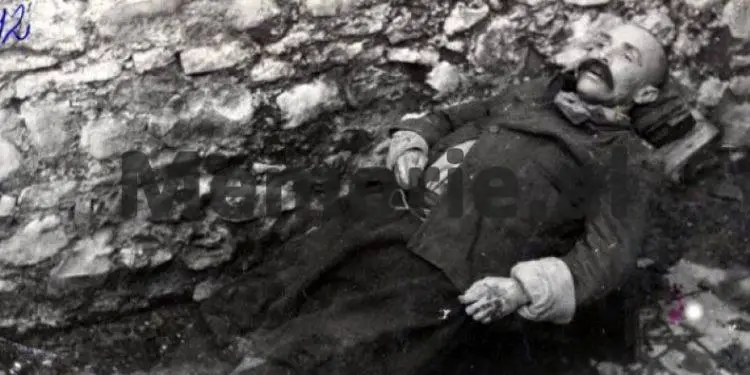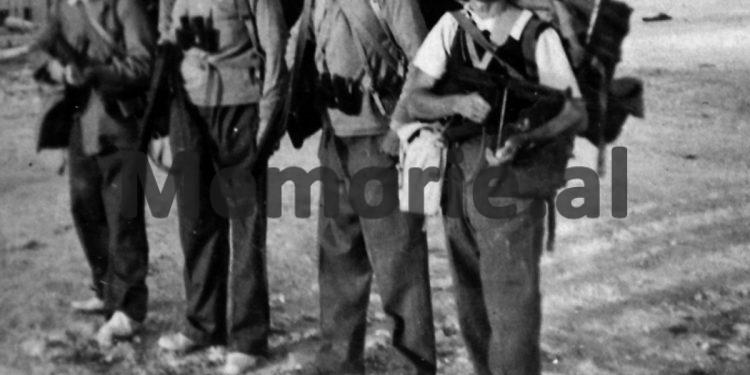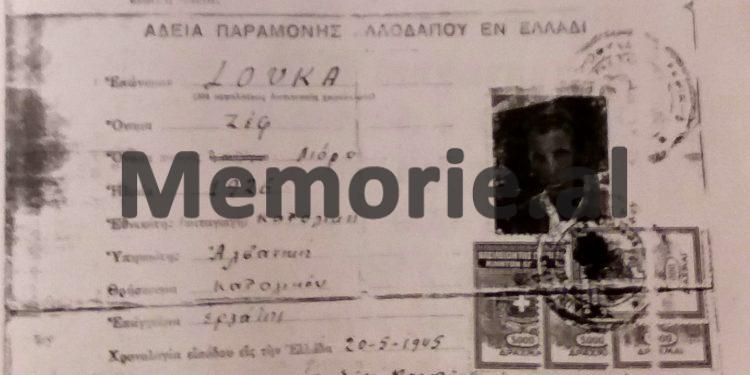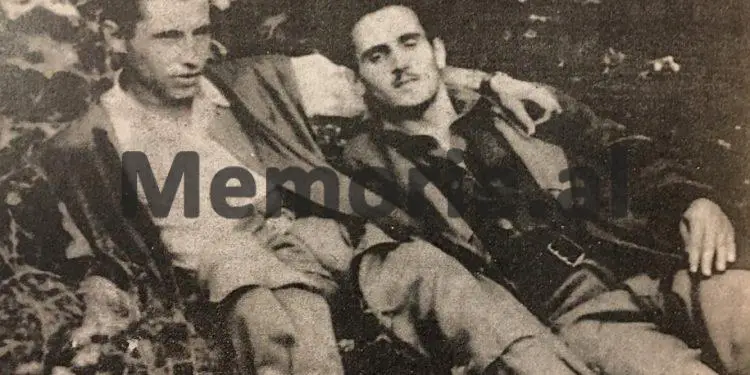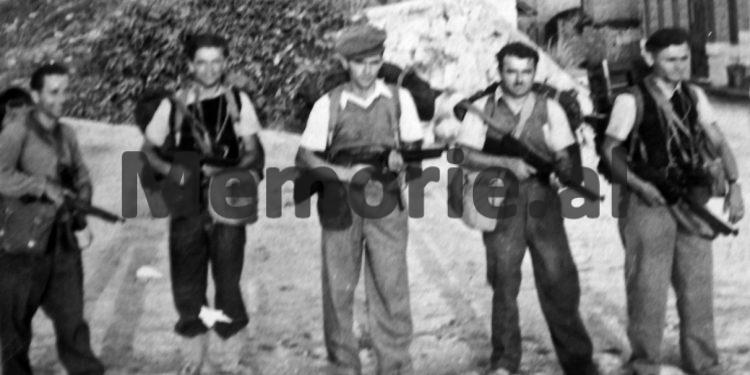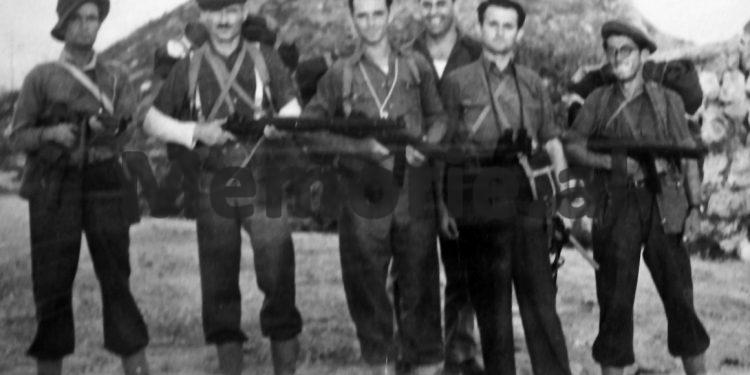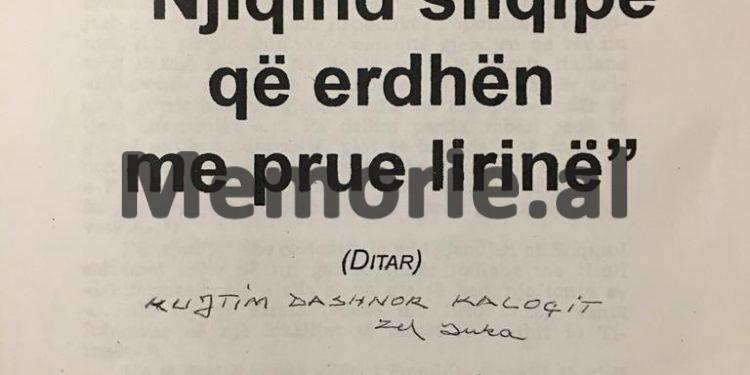Dashnor Kaloçi
Memorie.al publishes the unknown story of Zef Luka from Shkodra, who in 1946 escaped from Albania and went to Greece, where he stayed for several years in the camps of political asylum seekers. His acquaintance with Alush Lleshanaku, his training at an American-funded reconnaissance center on the outskirts of Rome, and his parachute landing in the Mirdita Mountains in 1949, where they stayed for nearly two years in the mountains in search of State Security forces. , taking refuge in some houses that had secure bases. All the vicissitudes of the “saboteur”, famous that became the horror of the State Security until 1953, where his name and activity for years was shown as in the legends in the city of Shkodra and throughout the North of Albania, are made public. according to the memoirs he has left written with his hand in the US, where he spent most of his life as a political immigrant, until the fall of the communist regime.
Together with the wild and bitter winter of December 1944 and January ’45, which had not been seen for a long time, most of the Albanians, at the end of those sad years, faced violence and genocide. never heard of. The newly arrived communist regime intensified its crackdown on its political opponents, with arrests, imprisonments, deportations and mass executions, which in a way had begun without ending the war. As a result of these reprisals and the uncertainty that reigned in the country due to the red terror, which became more and more fierce, the escapes of Albanians abroad increased greatly. Even in the South of the country, where the opportunities were a little bigger, there were massive departures towards the border with Greece, where the Communists and the Hellenistic nationalists continued to kill each other, due to the “accounts” still not closed since wartime. Among those Albanians who noticed the danger and the unknown road to the border with the neighboring state, in that icy early January of 1945 were some young people from Shkodra, who performed compulsory military service in a ward on the outskirts of the town of small of Delvina. The main organizer and leader of the group that was undertaking that dangerous adventure, where “playing with the head”, was Zef Luka, a young boy who had not yet turned 20. But were they able to cross the border and what was their future? Who was Zef Luka, what was his past and why did he and his friends embark on that extremely dangerous adventure? For all this, we know the unknown diary of Zef Luka, who after a series of vicissitudes in the camps of political asylum seekers in Greece, Yugoslavia, and Italy, as well as his adventure, wandering for three years in a row as a saboteur in the mountains and In northern Albania, in 1956, he finally settled in the United States, where he lived until a few years ago at a young age. From the diary of Zef Luka, which he has typed, we have selected for publication only a few parts, which he sent us shortly before he passed away to make them public in the press and we are giving them without no changes were made (only subheadings are editorial) and in the Geg dialect, as he wrote and experienced them half a century ago.
follows from the previous number
Zef Luka’s Diary: Our Armament as Parachutists
Our armament consisted of: a small parachute march, a 25-round cartridge, 6 cartridges of 50 rounds, 500 rounds of ammunition and two hand grenades. In two pockets under our pants we had a “Beret”. In addition, we were provided with food, steps, vitamins for 5 days and other medicines. Kol Çuni and I got one radio, and the other the generator, which we had on our chests because when we got off the plane and our parachute opened, we exploded the package (which we had on our chests), which had a parachute small but always connected to a hemp with our body so as not to lose the generator radio. This was done after some other groups that had fallen in Albania, had lost the radio of the generator, so that one group could not join the other. As happened to the first group of Alush Lleshanaku, Ndue Pjetri, Gjo Markajve, who could not complete the mission, were forced to leave Alush Lleshanaku in Greece, while Ndue Pjetër Gjo Markaj left in Yugoslavia. The leader of our group was Kol Çuni. In addition to the materials mentioned above, we also supplied a large package that contained: radio, food supplies, clothing, ammunition and medicine. This would be the first to be launched from the plane, which was pushed by Pashko Leka. After him, Pashko Çuni appeared on the chest with a radio, later I (Zef Luka) with a generator on his chest and so on. We were waiting for the time to fall in Albania. At night I left and went to Rome and only Kol Bib (Mirakaj) knew this. One day Kola gathered to see from us Dod Nikolla, who was hiding among the friars in Fraskati. Kola himself had been here before. The latter told me to call a fraternity and he would call me about Doda. I asked for the friar, whose name Kola gave me. Meanwhile, Major Dod Nikolla came, to whom I handed over the money. This was a secret.
December 26, 1949, parachute landing in Albania
At 4 o’clock in the afternoon, a bus arrives and takes us to the field of the military airport of Çento Çelle, which opened up to China Çita. Here we take a two-engine plane, wait for two people to come in, dressed in black, and have a black car. When they arrived, they asked us: How telegraphic are you? As they looked at each other, they left. The plane took off and Conte Coropio, even a bottle of cognac, gave us a drink, but I didn’t drink. Pilota tells us that we are above Shkodra. Only a string of lights could be seen. He told us that we all had to get out of the siren (Il Lancio). We were all in line. The big package was in front of the plane door and the first one was Pashko Leta. As the door opened on one side of it was Conte Coropio, while on the other side an officer, both of whom were bound by plane. The siren rang, and Pashko Leta pushed the package and Kola came out, who was a little measured, but I pushed him with Conte Coropio, and the other officer. As I stepped out, it seemed to me that the tail of the plane was making me cringe. Immediately I heard a noise that was like a shotgun. At that moment, my eyes filled with air. The parachute opened, I detonated the package I had on my chest in which the generator was placed, and the front of the package opened. In this case, I see that the predecessors of the other comrades also sat down faster, like balls. The lights were on, the lights were on. The wind was pushing me towards the Komi forest. Throwing them at the Survivor Meadows, or rather, they told me about the Survivor meadows, where the slopes were on the slope. I fell, my legs started touching the tops of the pine needles. I put my hands over my eyes so that nothing would hurt me. Here the flaws hang 50 meters. I grabbed a fir tree branch and when I flew near the thickest branch, I exploded the parachute and touched the ground, where there was some snow. Hana shone like the sun. I found the penultimate in which he had inside the march and the generator.
In the snowy mountains of Mirdita
When you fell, you saw a parachute that was not far from me. The white one belonged to Col Cuni’s radio, so only the radio and the generator were white, while the others were all in the paint of the leaf. I went in the direction I had without the white radio parachute. At that moment I heard a noise that was taking off my shoes. Who are you, tell me? Kol, I say, I’m Zefi. He, too, had been left hanging and said, “Come and help me.” I reply: Help me to catch the branch that is closest to you, blow it up. As I found the radio parachute, Kola sat down, but I saw that he fainted. I took some snow and put it on his face, and as it turned out, I told him: Take out your revolver, because Pjetër Gjoci had his march so that Kola would not run away. They wanted to charge me with this, but I said no. I want to put the march on. Before we left, they had given us some that were whipping like birds. I whipped them but no one answered. It was impossible to feel, from the noise of the plane my ears were still ringing. In this case, I told Kola: Nobody answers, so I’m shooting with “Baret” (revolver). He said: What is the matter with you? I cried, but still, no one answered. Maybe after we had the order not to shoot and wait 24 hours until we joined each other. Then I fired the march (automatic weapon) and someone answered me. As I approached you he asked me: Who are you? I answer Zefi. I saw that it was Bardhok Gjeta and Ndue Frisku. They asked me if you had a radio and I answered yes. Are you all, I ask? Yes, they say. I followed in my footsteps, I saw where I had left Kola and the latter was not where I had left him, but a little closer. Kola, when he got off the plane, had lost the teeth that the Falco had.
Bread supply to Gjon Kuka house in Fan
When we went to go to other friends, I turned to Kola with this question: Where is your revolver? And he said: I have forgotten it where I was before. Later we met other friends. Pjetër Gjoci of nep Kola marina, which belonged to Kola, but the latter was still dissatisfied, says that we have come in vain, not only us but also others. Pata felt that Kola had refused to fall for the first time when Ndue Pjetri and Ndue Mëlyshi, Alushi and Xhevdet Blloshmi had fallen. During the time on the mountain, I had forgotten to take the march to the spring where we drank water, so one of our friends had to go and pick it up. After we landed, we searched for the night until the light came on, the big pack of qi had a spare radio, food, clothes, ammunition, and so on. There was a shepherdess near us, a young girl, wearing a belt around our waist. She closed her chest with her doors so as not to be seen. There was also a brother who was standing behind the goats. When he saw us, he remembered that we were partisans, but I told him that we were the soldiers of John Mark John. It was approaching 9 o’clock when we would be on the radio. We were at Qafa e Lorit, at this time Kol Çuni is talking about Rome, which, without figures, responds to “Bruna”, who wants me to be forgiven. Gjon Gjinaj received us and we decided to go to Fan of Mirdita, the village of Gjon Gjinaj. After we waited for it to get dark, the latter said to me: Zef, come with me and I will fall into the village. We approached the first house that happened at the top of the village, this was Gjon Kukës’ house. As we approached the window (which was closed) near the door, John listened and said to me: There is a stranger here, so we left for a while and sat near a juniper. It wasn’t long before a woman came out in need, and John said to her, “Do you have a husband to take you?” This answers: It is not the job of the sawmill. And he continues: We have felt that he has come out in Greece. Yes, says John, but last night we saw a group of 30 people. He wants bread for us. (John lies to me so I can get as much bread as I can) and he answers: Go and wait for the wall of the new house because I’m taking your husband’s brother, but as soon as the mayor leaves. After half an hour, Gjon Kukës’ brother came, trembling with fear. As he talked to John, he went to the house and brought us bread. After three days, Gjon Kuka comes from the sawmill of Kryeziu. Gjon Gjinaj says to Gjon Kukës: You know two houses, you and Zef Voc’s house, for the supply of our food in the winter.
How we spent New Year’s Eve 1950
We were at the top of Runa. It was snowing at night, we had some food and a spatula. Ndue Frisku and Bardhok Gjeta made tea to keep the fire burning. As the light came on, we didn’t recognize each other because we were all blushing and touching the to hold it in her hand from the cold. At the top of Runa, the inhabitants of these provinces shot summer cattle in the mountains. There we built a hut and baked the bread with breadcrumbs, sometimes baked and sometimes unbaked. From the cold, I had chest pain and my friends told John that Zefi was a deer, but he replied that it was a pain in the ass, from unbaked bread. As evening approached, we went out to collect dry, skinless wood so that it would not smoke. From the cold, my hands froze, and John began massaging me tightly. The next day, when the light came on, my fingers began to fall off. The province where we have had a really beautiful view and especially when the sun was setting, there was nothing more beautiful, like a paradise. The branches of the trees looked like crystal. From the top of Runa, when it was clear, the sea could be seen. When I was a guard, I saw two people coming. I informed them, it was Gjon Kuka with a fugitive for blood, Pjetër Gjeta. They also had a goat with them. I take the goat and tell my friends that Gjon Kuka and another man have come, they have brought a male goat, they want white meat and half a bag of bread. Everyone laughed at me for calling them “male goats.” I later learned that this is called. Every day at 9 o’clock, we connected with Rome but did not tell them where we were. As we passed the winter at Maja e Runës, we set off. The snow was up to the waist and we walked through the water so as not to leave a trace. The journey took about an hour. There were communist villages around, we went to Korava, near the river Zij at the Mark Paluca station. After the table was finished, Mark asked me: Where are you from? I answer: I am from Shkodra and they call me Zef Luka. We stayed at his house for about two weeks and after these days we would leave for Fushë e Lajës, where they would be thrown away (parachute supply from foreign planes). In Korava we would let Kol Çuni on the radio, Pashko Letën, and Nikoll Markun. I add that the latter (Nikolla), the night before, had tried to escape without going to Korava. But Pashko Letaj and Bardhok Gjeta caught him. In this case, Nikoll Marku shouted: “Gjon Gjinaj is in your hands”. Lena, Mark Paluca’s wife, had blackened our groin so thick that she had thrown it in a towel, and they gave us some bread for the road. We met with Cuf Paluca, with other friends and left him to be seen at Fushë e Lajës. Even with Zef Vocin who had gone to the mountain.
How did the State Security find our parachutes?
We leave for Fushë Lajës: Gjon Gjinaj, Pjetër Gjoci, Bardhok Gjeta, Pjetër Gjeta, Mirash Marku, Ndue Frisku, and Zef Luka. As we were leaving for Laje, John said to me: Zef, come with me. I listened to him and with him, we went to the village to a house that John knew. The door was opened by a young woman because she did not have a husband, the Party had killed her. She knew we had come to beg for bread and she didn’t spare us, but just as she had shot the children on the mahogany, she took it and gave it to us. But John and I told him not to eat this bread and we refused. But this soybean hardly gave it to us, they said: “They eat tomorrow, but you have nowhere to take it.” We went to Shkoza to the house of Nikol Pjetër Shkoza, where we were shot with meat and cabbage. Then we left for Laje. We find out that the reactionaries of Fan of Mirdita had gone to the forest of Komi and were waiting, there are two or three oaks (needles) to take the pre-cadets, which would be used by women and children. Wearing these clothes, you go to a village conference, the Security finds out and they deport them to Tepelena. I add that in the parachute they had also found the large package that contained penicillins, radio and many other things up to the toilet paper. Gjon Kuka is interned, while Zef Voci, who goes to the mountains, finds out that in those days God had forgiven a boy. As we left Shkozet, we passed Sharra e Gojanit and Livadhi e Hamzit and arrived in Fushë Lajës. There was a broken stall. We are waiting for you to be dark. Before 8 o’clock in the evening we would light three candles. We had orders to meet with Çup Paluca, Zef Vocin qi who had gone to the mountains and other loyalists, with whom we had a meeting.
Order from Rome: Do not go to Yugoslavia
As for the first time guard. I see Fran Kola coming, I ask him why you came. He replies: I left the Yugoslavia on the ground. I have a letter from Kol Bibë Miraka that you go on the radio at 1 o’clock in the afternoon, you use the old digit. We had a set time of 9 o’clock in the morning, but now it would be up to us to go out twice a day. After reading the letter, I said with a sigh: Now that I have eaten the devil, this letter has passed through the hands of the UDB. I immediately thought of betrayal. As I was continuing the guard, when 1 o’clock came, Kol Çuni called out according to the old figure, but he could not be contacted. Kol Çuni kept this a secret, but he did not know that I knew it before him. After a few years of writing in Rome, we learned that Col. Bib Mirakaj and Shyqri Bicaku had secretly met with the English Intelligence Service to contact us. Yugoslavia’s trainers told us that the UDB had orders to tell you, “You can come to us, but don’t interfere with our politics.” Rome makes a telegram: You parachutists do not go to Yugoslavia. We supply you with air until you leave for Greece, in Yugoslavia we cannot provide for you. “And to go to Greece, it took them a month, as the persecution was great, baseless, oftentimes uncertain that you were alive.
The preparation left me Albanian and the departure to Yugoslavia
We are preparing to leave the mission and go to Yugoslavia. I kept my word to Alush Lleshanaku that as long as he was alive, I would not leave Shqipni. The situation was getting worse every day. People used to tell us that they were spies from outside. Those of the National Committee “Free Albania” brought them alive as soon as they set foot in Albania, as happened with Hamit Matjani, Alushi’s friend. The best boys in Albania. Zef Luka and Pashko Leti, paratroopers, leave for Yugoslavia, leaving Kol Çuni, Mirash Marku and Pal Miraka with friends, who go out to supply the waste. The first group to Yugoslavia consisted of Zef Luka, Pashko Leta, Pjetër Gjoni with his wife, Katrina, Vat Staka, Fran Sokoli, Preng Keqani with Gjini and Fran Kola. The latter two were later killed on the ground. I went to a base that the Security had in that house (when he went for bread), they killed Gjini and his friend when he was fleeing to drown in Dri. We continue our way to Yugoslavia. In the village of Bugjon, Fran Sokol’s father, Ismail Qerimi, and Gjini went beyond Drini and killed Marka Celin. We passed Gramisht, Va Tranzi, Ras Valbona and Dushaj. We met Sheh Halili, later in the United States, who built Halvetije Teke in New York. Sheh Halili escorted us until we left and crossed the border into Qafë Gjonej.
“The murder of Alush Lleshanaku with friends in October 1950”
One of the pages of Zef Luka’s diary, a former member of anti-communist resistance groups who parachuted into Albania several times in the early 1950s, also shows the assassination of Alush Lleshanaku, one of the leaders of that resistance. which had been pursued by the State Security for several years. Regarding this murder, which even today has remained a great enigma, his close friend, Zef Luka, among other things wrote:
But as soon as I got up I went out the first guard. At night I dreamed that around a pit there were open corpses. At 9 o’clock, as usual, we called Rome, which told us that we had telegrams with you. The telegram reads: “Radio Tirana has given the news that Alushi has been killed, give us details”. Immediately on the sunny day, we went to the village to the priest, took the “Fairy of the People” and immediately gave Rome the news that as the newspaper wrote: He was killed at 4 o’clock in the morning, as he crossed the bridge at Shkalla Broshka. The youth, some of whom were also communists, said, “Alush, what do you want me to do?” Many of them had their students. Alushi loved Albania more than his mother. The northern group was deeply affected by Alushi’s murder but in particular that of Elbasan. But since Alushi spent a long time in Shkodra, in Puka, in Mirdita for radio supplies, our only consolation was that this danger did not occur in the North, as it would have left them ashamed and ashamed according to the canon throughout the North. With the assassination of Alushi, other groups were banned from entering Albania, such as that of Xhevdet Blloshmi, Shyqri Bicaku, etc. For that reason, they put Alushi in the Boboli maple. He also called his wife to come and see her, but she did not go. Alushi’s friends were: Halil Hoxha, Rexhep Kasa, Abedin Cengo, Nuri Plaka, who were killed and Zenel Cema who was injured”.
“Effort with Security, Marka Zefi kills his father”
In Zef Luka’s memoirs, many tragic moments are described, with which the anti-communist resistance groups faced during their missions in Albania. One of them is the armed struggle with the State Security Forces of the Shkodra and Mirdita group, which included Zef Luka himself. Regarding that event, where some of his friends were killed, among others, Zefi wrote:
“The Mirdita radio group is shooting at the Security. It consisted of Gjon Gjinaj, Pjetër Gjoci, Ndue Mëlysh, Bardhok Shkurti, Marka Zefi with his brother and father, Zef Ndreca and Marka Lleshi, etc. At this time, Marka Zefi’s brother was killed, while the machine gunner cut off both hands, Zef Ndreca. The latter tells his son (Marka Zefi) to kill him. But the boy says, “Dad, look back so the partisans don’t come.” And when Zef Ndreca, Mark’s father, brings his head back, Marka Zefi kills his father, so as not to be left alive in the hands of the communists. At the top of the hill was a machine gun. A small stream came in our direction. Mark Zefi calms down in them, but the machine-gun fire comes close to Mark, who falls and falls into the water. At this time Ndue Mëlyshi, calm down in that direction. Mark Zefi gets up and drops a bomb right on the machine gun, opens the siege and kills an officer and two soldiers. As they passed the siege, Gjon Gjinaj was wounded. John was wearing baggy and long pilot pants. In this case, John had to kill Vedi, but his friends did not let him. He was dragged away and taken to a nearby house. Security goes for traces of blood to the lead to check it. The lady of the house opens and leaves the box open, while John is behind the coffers and in this case removes the fuse from the bomb. When the partisans open the door, they see only the open box and the dry room. I later held that bum in my hand until I threw it into the river. Later, Gjon and Jig were shot in the mountains. We, parachutists, had decided: To kill Vedi, or to be killed by my comrades, so that I would not be caught alive. If the latter happened, they would ask us where we got bread and other things. When the Security Forces surrounded us, he fired a squad of squirrels into the ambush, so that no one would be able to escape. And this was a Russian tactic that did not look at all its soldiers, enough to eliminate anti-communist gangs”.
Memorie.al




